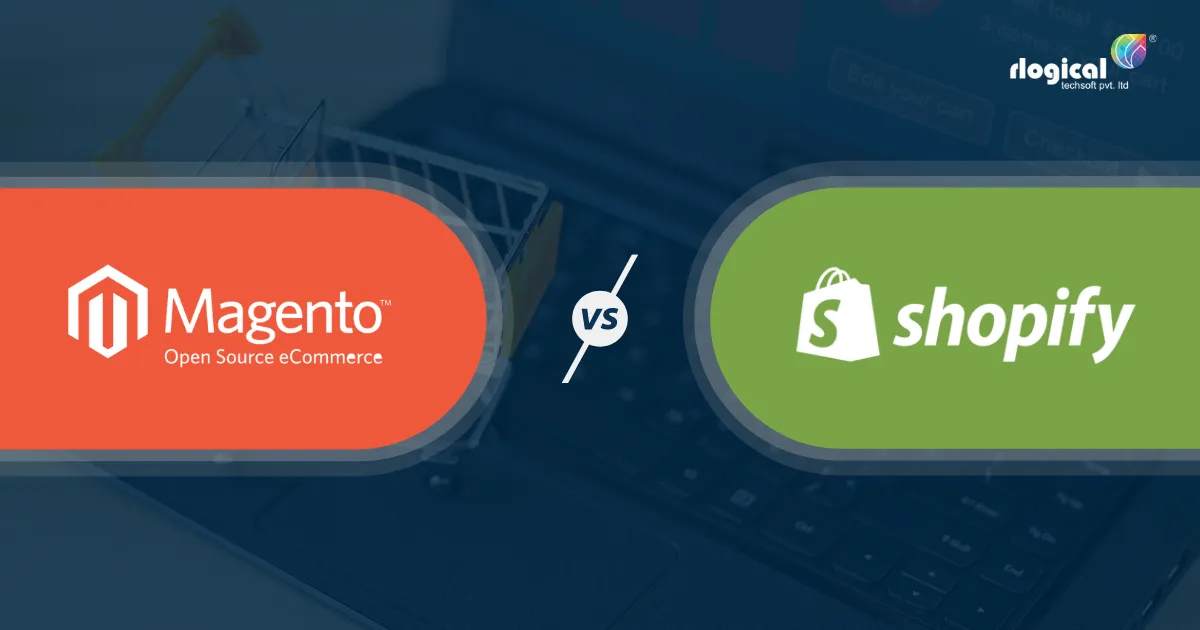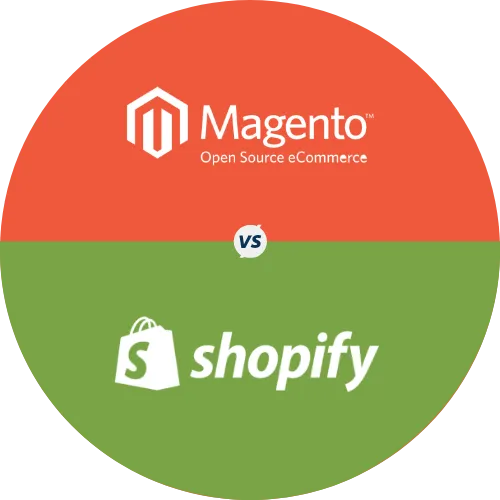
All businesses within the present digital commerce industry must try to make a comparison between Shopify and Magento. The selection of the eCommerce site helps create a deeply rooted base that in turn, becomes the justification for a profitable industry. Before answering which, one is better, here we have presented a comparison which will help to differentiate Magento eCommerce development services from Shopify Development Services.
Suppose you are the owner of a self-driving vehicle. You simply need to provide your endpoint in the system and depend on the automobile to take you through the traffic after planning the route. In this case, Shopify is similar to the self-driving vehicle, which can handle the technical process automatically, including coding, programming, as well as other back-end procedures without you doing anything. Put simply, technical intervention is not required right here.
On the contrary, suppose your buddy is the owner of a manual vehicle. Although it has got an identical mechanical configuration, your friend has to figure out the route which he is going to take.
Magento can be defined as the manual vehicle, which is open for personalization and receives input from the end of the developer. The source code will be available universally, and it is up to you how you like to tweak it.
Below, we have presented a comparison guide between Shopify and Magento, which will help us to make a sensible business decision.
What do you mean by Magento eCommerce development services?

Being an Adobe product, Magento was founded in the year 2008. It is a platform that is powered by PHP and accounts for approximately 35% of all e-commerce sites. Heralded as a product with an open-source, Magento is a significant accomplishment for its growing contributor community. The ability to customize happens to be the most notable thing about Magento. Any innovative developer will be able to perform many things with Magento for providing an unmatched customer experience.
Being a custom-made solution, it is possible to use Magento by enterprises as well as startups. In case you happen to be a startup, the open-source solution of Magento will be appropriate for you. On the contrary, if you are a medium-sized or big enterprise, other options to consider will be Magento Commerce Cloud and Magento Commerce.
The well-known Magento outlets consist of Ford, Budweiser, and Coca-Cola.
What do you mean by Shopify development services?

Well known as a hosted e-commerce app development platform, Shopify does not allow us to manage the technical things. Founded in the year 2004, the product was created by the development team for satisfying personal requirements, and at present, it has the distinction of powering more than 1 million companies across the globe. Being a plug-and-play platform, Shopify provides support around-the-clock. Moreover, the user-friendly interface makes it quite popular among the customers too.
Shopify happens to be a ready-made solution supporting appropriate plans for established enterprises as well as startups. The basic version of Shopify will come of use to you in case you happen to be a startup. Apart from being simple to use, it will provide you with a professional background, although it isn’t free as compared to Magento. On the contrary, Shopify comes with an advanced and standard version which one can customize according to the business requirements.
The well-known Shopify outlets consist of Red Bull, Kylie Cosmetics, and Tesla.
Must Read: How to Prepare For the Future of E-Commerce Following COVID-19?
A basic comparison of Magento vs Shopify
Magento |
Shopify |
| Open Source Platform | Hosted Solution |
| Upgraded to Magento 2 | Upgraded to Shopify Plus |
| Demand expert coding skills | Easy to use platform for small to large |
| Time Consuming | Quick Setup & Integration |
| Built-in marketing functionalities | Accessible App store with 3rd Party Integration |
| Manual Security & versions updates | Automated version updates |
| Limited Gateway Options | 70+ built-in payment gateways |
- While Magento was founded in the year 2008, Shopify was introduced in 2004.
- Magento is built on PHP while Shopify has been built on Ruby.
- The solution type of Magento happens to be open-source, while that of Shopify is hosted.
- Magento will be appropriate for companies with large product catalogs, and Shopify is ideal for small-scale companies out there.
- The versions of Magento happen to be Open-Source, Magento Cloud Commerce, and Magento Commerce. On the other hand, the versions of Shopify are Basic Shopify, Shopify, as well as Shopify Advanced.
- Magento has been upgraded to Magento 2, while Shopify is upgraded to Shopify Plus.
- The number of applications as well as add-ons of Magento is 3000, while that of Shopify is 2400.
A comprehensive guide between Magento vs Shopify
In the following section, we have tried to reveal the differences between Shopify and Magento depending on several parameters.
1. Price
The most notable thing regarding starting with Magento development happens to be the basic version, which is available for free for kickstarting your e-commerce business venture. A couple of advanced paid versions are also supported by the e-commerce app development platform for prospering your business, which is Magento Commerce Cloud and Magento Commerce. These 2 versions do not come with any fixed pricing since it will depend on how you personalize your store.
On the contrary, Shopify provides a free trial for 14 days, and you need to pay a fee beyond that. Shopify is a plug-and-play solution, and the cost is going to vary from one plan to another. It will provide you with virtually everything, including online store features, payment gateway integrations, shipping, apps, and so on. With Shopify, you have the facility of upgrading or downgrading the plan anytime.
2. Simplicity of usage
The Magento developers can be proficient at managing other aspects related to technology since the simplicity of usage depends on their skill. It is also imperative for them to have proper researching skills for accessing code that is contributed by the community.
Magento isn’t user-friendly in terms of managing the Magento CMS. However, the notable thing is that the developer has the freedom for experimenting and applying their innovativeness. Lots of developers across the globe are also supported by Magento and it comes with an active support center providing support around-the-clock.
The interface of Shopify is simple to use for even the people who are not tech-savvy. The “drag-and-drop” convenience of the platform makes it extremely easy to create an online store. It is possible to customize the store, set up methods of payment, plus add or delete products. Above all, Shopify offers 24-hour support, email support, as well as a live chat option.
Also Read: NopCommerce vs WooCommerce
3. Global commerce
In case the Magento development platform is chosen by you, you’ll come with a definite advantage since it requires just a single Magento instance for supporting multiple e-commerce sites, languages, international shipping providers, and local payment methods.
Having a forum that is community-based and is an open-source platform, it will be possible for a developer to look for assistance from anywhere regardless of geographical limitations. Despite being paid, Shopify is not able to provide currency support, multiple-language support, or payment systems that are localized. It has a lucrative market in North America at present.
4. SEO
Identical search results are offered by Magento as well as Shopify regardless of the platform. You’ll come across quite a few apps and search engine functionalities provided by both Shopify as well as Magento for sustaining proper search engine optimization results.
5. Availability of upgrades
Individuals who are operating e-commerce platforms on Magento need to migrate from Magento 1 to Magento 2 since the support for Magento 1 has been stopped by Magento since June 2020. Magento 2 introduces some innovative features, which consist of enhanced product catalogs, a simple approach to admin activities, and framework enhancements. Although the migration will require a one-time cost, it will result in positive ROIs eventually.
On the contrary, a new version has been introduced by Shopify which is appropriate for many big companies out there. This new version is known as Shopify Plus. It introduces lots of possibilities which make the up-gradation worth the cost. Lots of features and extensions are provided by Shopify Plus at present, and for this reason, its price is on the higher side. Its plan begins from approximately $2000 every month.
Magento Pros
- Timely updates
- Lots of payment options
- Intuitive interface
- Provides almost 15,000 extensions and plug-ins
- Will be able to handle sizable incoming traffic
Magento Cons
- The developers of Magento will be required
- Security depends on the configuration level
- Resource intensive
- More appropriate for enterprises
- Documentation is extensive
Shopify Pros
- Timely updates which are implemented automatically
- Easy to set up and quicker to launch
- High-security and reliability
- A plug-and-play solution
Shopify Cons
- Quite extensive
- Cannot be hosted on the server
- Restricted control on your outlet
- Store migration is complicated
- Applying customizations is complex
Also read: How much would it cost to develop a POS like Vend or Shopify?
Which is more powerful for e-commerce app development: Magento or Shopify?
It is a fact that both Magento, as well as Shopify, differ on different parameters, which makes it essential to evaluate them before commencing your e-commerce enterprise. Look at these aspects before making a selection:
- Your budget
- The store size as well as corresponding business requirements
- The customization level which you are planning
- How you visualize your e-commerce store shortly
- Whether you have developers or are searching for a simple plug-and-play solution
Make it a point to look for assistance from Magento and Shopify certified organizations for discussing your requirements. These professionals will assist you in selecting the appropriate e-commerce app development platform. GET IN TOUCH
Jatin Panchal
Jatin Panchal is the Founder & Managing Director at Rlogical Techsoft Pvt. Ltd. For more than a decade, he has been fostering the organization's growth in the IT horizons. He has always bestowed personalized approaches on .NET, PHP, Flutter, and Full-Stack web development projects. From startups to large enterprises, he has empowered them to accomplish business goals. By delivering successful industry-driven solutions, he is encouraging the capability of AI, ML, blockchain, and IoT into custom websites and hybrid mobile applications.
Related Blog
Categories
- All
- AI Development Services
- Amazon Web Services (AWS)
- ASP.Net Development
- Azure Web App
- Big Data Analytic
- Customize
- Digital Marketing
- Drupal Development
- E-commerce web development
- Education Mobile App Development
- Enterprise Application
- Event Management App Development
- Fintech
- Fitness App Development
- Food Delievery
- Front-End Development
- Grocery App Development
- Healthcare App Development
- Hire Dedicated Developers
- Hotel Booking App
- IT Industry
- JavaScript Development
- Mobile App Development
- On Demand App Development
- On Demand Healthcare App Development
- PHP Development
- POS Software Development
- Real Estate Mobile App Development
- Retail Business App Development
- Salesforce
- Social Media Development
- Software Development
- Technology
- Transportation App Development
- UI/UX Design
- Web Design
- Web Development
- Web Services
- Web/Data Scraping Services
- WordPress




 Jatin Panchal in E-commerce web development
Jatin Panchal in E-commerce web development 




